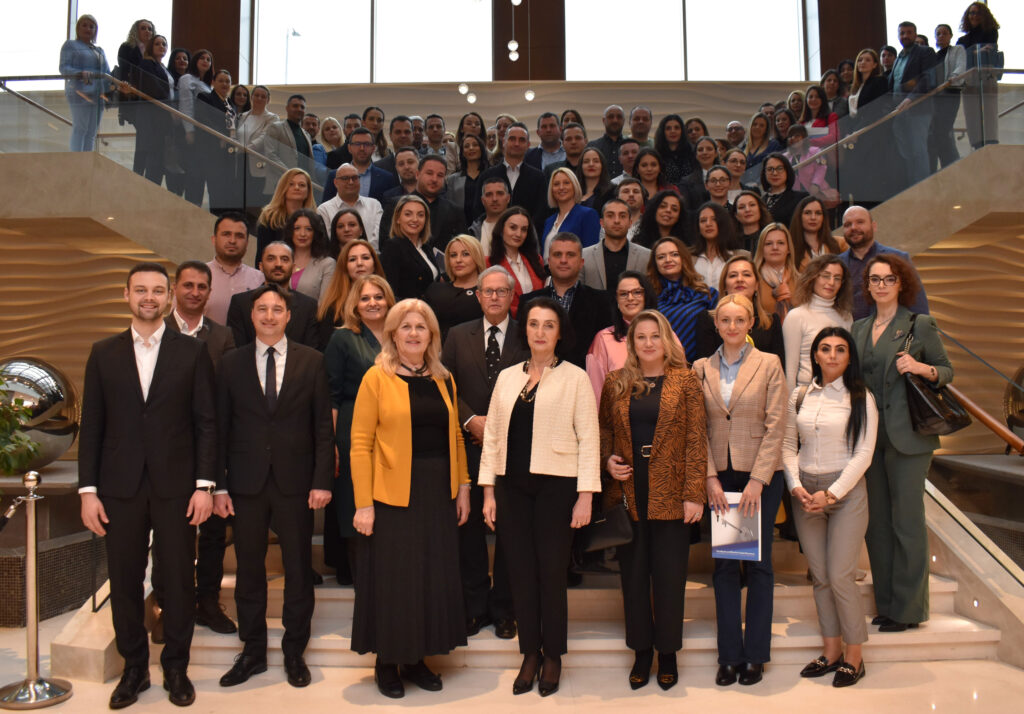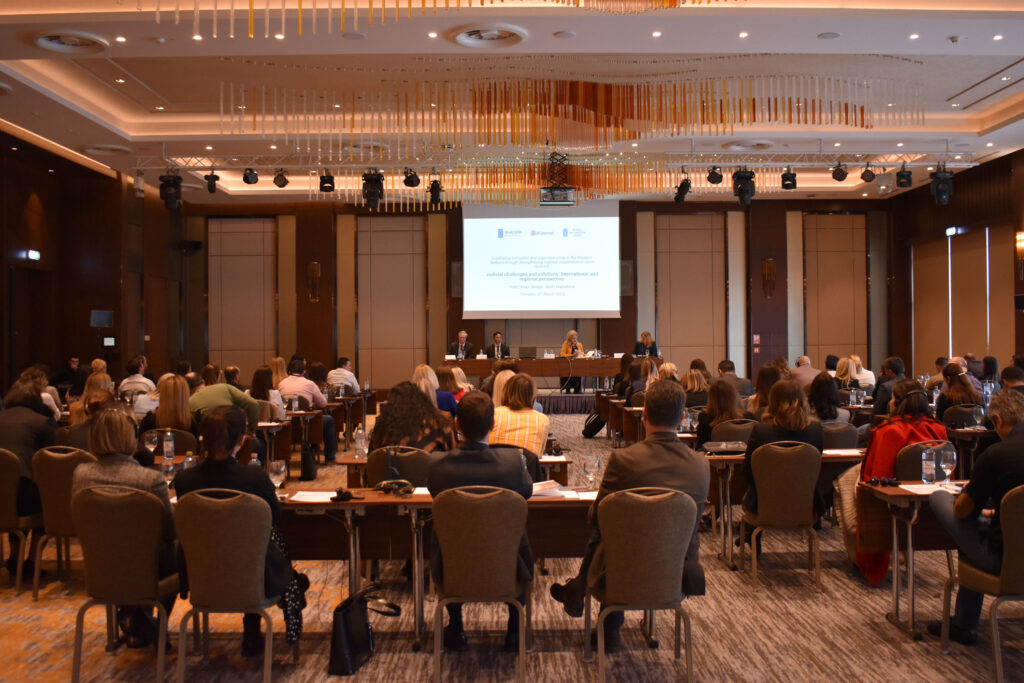
On 2nd of March in Skopje, the AIRE Centre and the Regional Anti-Corruption Initiative, in cooperation with the Academy of Judges and Public Prosecutors in North Macedonia, held a training for judges and prosecutors about asset recovery, the process of depriving criminals of their illegally obtained wealth. Participants had an opportunity to learn more about the importance of asset recovery in the fight against corruption and organised crime, overview of asset recovery efforts in the Western Balkans as well as the role of the European Public Prosecutor’s Office when it comes to this topic, from both national and international experts.
Lecturers included Jaka Brezigar, prosecutor at the European Public Prosecutor’s Office, Judge Michael Hopmeier, who sits as a judge at Southwark Crown Court in London, Radmila Dragičević Dičić, judge at the Supreme Court of Cassation of the Republic of Serbia and Sandra Krstić, judge at the Basic Court Skopje.
Participants were welcomed by Natasha Gaber-Damjanovska, director of the Academy of Judges and Public Prosecutors in North Macedonia: “Systemic corruption and organised crime are persistent problems in all countries of the Western Balkans, despite successes in strengthening relevant legal frameworks and establishing anti-corruption institutions. The Republic of North Macedonia as a state continuously takes all the necessary steps, establishes mechanisms and finds solutions that will effectively deal with corruption, but it seems that all this is not enough. Our country is not the only one dealing with this, as the fight against corruption is a global problem, therefore, international cooperation and support is extremely important, especially in the countries of the Western Balkans”.
Nevena Kostić, AIRE Centre Project Manager said: “Asset recovery is not only about assets. It is about rule of law and about the concept that no crime can go unpunished. Indeed, with good practice and good examples of action against organized crime and corruption, we can bring back the trust of citizens in their institutions“.
“Western Balkans’ countries can take joint action when it comes to depriving criminals of their illegally obtained wealth, and practices of the European Public Prosecutor’s Office can serve as valuable examples for judicial institutions in this region, especially when it comes to cross-border investigations. Just in 2022, the European Public Prosecutor’s Office had 1117 active investigations, raised 87 indictments and had freezing orders for assets in value of over 359.1 million Euros“, said Jaka Brezigar, prosecutor at the European Public Prosecutor’s Office.

“It is extremely important for future judges and prosecutors to understand that asset recovery of illegally obtained wealth is the most significant result of the fight against organised crime and corruption, as it makes that fight itself more visible, and therefore it deters crime and restores citizens’ trust in the state. Organised crime and corruption rule this region, they are deeply rooted in all layers of society. That is why it is necessary to strengthen awareness of the importance of joint action, as well as independence and integrity of the judiciary. This project is successfully working toward this goal and creating a network of experts from the entire region”, said Radmila Dragičević Dičić, judge at Supreme Court of Cassation of the Republic of Serbia
“The phenomenon of obtaining wealth in an illegal way is prone to changes and is very flexible, and it also affects all countries across every continent. Therefore, judicial practice must ensure the consistent and unified application of the law which is the duty of all judges and public prosecutors”, said Sandra Krstić, Judge at the Basic Court Skopje.
Asset recovery is a formal and integral part of all previous National Strategies for reforming the judiciary. Furthermore, the National Asset Management Agency, established within the Law on the Management of Confiscated Assets in 2018, has elaborated two strategic plans in order to strengthen the capacity for conducting financial investigations and asset confiscation. While this is a positive step towards introducing a systematic approach to asset recovery, it should be implemented in practice and further developed, which may require further support from external international specialists.
Furthermore, in North Macedonia, legislation for the freezing, seizure and confiscation of instrumentalities and the proceeds from crime are provided for in the Criminal Code and the Criminal Procedure Code. There have been no new asset recovery instruments adopted or amendments to existing asset recovery provisions since 2018. However, a working group is currently established within the Ministry of Justice to consider a number of amendments to the CPC in order to provide a better perspective for confiscation. The Ministry of Justice has also established a Working Group focused on drafting a new CC, including issues relating to confiscation.
Effective implementation of domestic legislation and international standards is a crucial aspect of the fight against crime and plays an important role in building public confidence in both national and international institutions. AIRE centre and RAI are contributing to raising awareness about challenges North Macedonia still faces, by organising educational events and issuing publications on best practices that should be implemented in this country.
The education “Judicial challenges and solutions: International and regional perspective” was held as part of the project “Combating corruption and organised crime in the Western Balkans through strengthening regional cooperation in asset recovery”, implemented by the AIRE Centre and Regional Anti-Corruption Initiative – RAI and supported by the UK Government. Find out more at Asset Recovery Platform.

